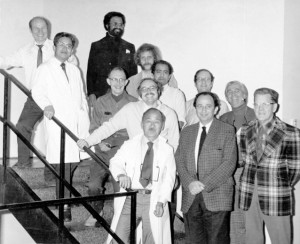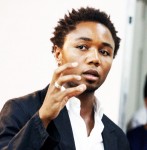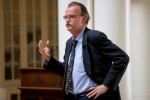The College of Science and Letters will host six lectures this spring featuring distinguished scholars from Columbia, Harvard, Fermilab, and more. Students, faculty, staff, alumni and friends of the university are welcome.
Topics will range from the architectural dimensions of the founding of the United States, to an “artificial leaf” that can make fuel from sunlight, to financial bubbles through the lens of mathematics.
A special lecture will honor Biology Professor Emeritus Dale Webster, who taught at IIT for three decades beginning in 1968 and founded the field of bacterial hemoglobins.
Please RSVP here. All of the lectures are free and open to the public. They are:
“Democracy and the Built Environment”by Peter Onuf, Thomas Jefferson Memorial Foundation Professor of History,
University of Virginia, and Marshall Brown, assistant professor of architecture, IIT
MTCC Auditorium, February 26, 7 pm (reception follows)
The architectural dimensions of the American experiment, from the perspective of founders like Thomas Jefferson and George Mason and that of contemporary architects and urban planners.
Benjamin Franklin Project lecture sponsored by the Social Sciences Department and the Jack Miller Center
“Pluralism and Pragmatism: Perspectives on Protein-Folding” by Sandra Mitchell, professor and chair, History and Philosophy of Science, University of Pittsburgh
MTCC Ballroom, March 1, 2:30 pm
Philosopher of science Mitchell explores how different perspectives of protein-folding–intra-atomic forces modeled in silicon, chemistry structures in vitro, and cellular interactions in vivo–interact to enrich our understanding of this fundamental process.
Sawyier Lecture sponsored by the Department of Humanities

1976 Biology Faculty: (front row) Nicholas Grecz, Kiyoshi Kusano, William Danforth, Dale Webster, Daniel Koblich, Allen Roush; (back row) Donald Jasper, Donald Farquharson Pranab Sarkar, Robert Roth, and Francis Hoskin
“Hemoglobins: from Man to Bacteria and Back” by Serge Vinogradov (Ph.D. BIOL ’60), professor of biochemistry and molecular biology, Wayne State University
MTCC Ballroom, March 7, 4:00 pm (5:30 pm cocktail reception)
Vinogradov is a leading scholar in bacterial hemoglobins, now widely studied in terms of structure, function, and evolution and for practical applications.
Lecture honoring Professor Emeritus Dale Webster sponsored by the Department of Biology
“The Energy, Intensity, and Cosmic Frontiers” by Pier Oddone, Ph.D., director of Fermilab
Perlstein Hall Auditorium, April 4, 3:30 pm (5:00 pm reception)
Oddone received the Panofsky Award of the American Physical Society for the invention of the Asymmetric B-Factory. He is a fellow of the APS and the American Academy of Arts & Sciences and a member of the National Academy of Sciences.
Lederman Lecture sponsored by the Department of Physics
“The Artificial Leaf” by Daniel G. Nocera, Patterson Rockwood Professor of Energy, Department of Chemistry and Chemical Biology, Harvard University
MTCC Auditorium, April 17, 4:00 pm. (5:30 pm reception in MTCC Ballroom)
Nocera’s research focuses on developing inexpensive new energy sources for the world’s poor. Most famously, he created an “artificial leaf”–a silicon solar cell with different catalytic materials bonded onto its two sides–that makes fuel from sunlight.
Kilpatrick Lecture sponsored by the Department of Chemistry
“Financial Bubbles Through History, Viewed Through Mathematics” by Philip Protter, professor of statistics, Columbia University
MTCC Auditorium, April 22, 3:30 pm
The history of the western industrialized world is rich with the stories of financial bubbles. Protter will explore how to use mathematics to detect whether a market bubble might be occurring and–in principle—to reduce to some extent the wild swings of the market.
Karl Menger Lecture sponsored by the Department of Applied Mathematics


